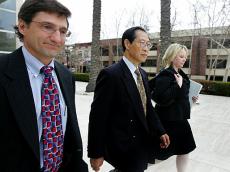First U.S. economic espionage trial under way
In 1996, the U.S. Economic Espionage Act was passed, making the theft or misappropriation of a trade secret a federal crime. No one suspected of economic espionage has gone to trial (six settlements) – until Tuesday, when a Chinese-born engineer, now American citizen, went to court in Santa Ana, California for stealing trade secrets pertaining to the U.S. space program.
For three decades, Dongfan (aka Greg) Chung – now 73 – allegedly stole more than a quarter million sensitive documents from his workplace (first Rockwell Intl and then Boeing) and passed them on to the Chinese, without anyone in the U.S catching on. When charged in court on Tuesday with counts of conspiracy, economic espionage, lying to the feds, obstructing justice and acting as a foreign agent, Chung pleaded innocent.
 According to the prosecutor, Assistant U.S. Attorney Greg Staples, some of the documents Chung pilfered had secret info on the U.S. space shuttle’s phased array antenna, the Delta IV booster rocket and how to solder metal for space resistance. This may not seem like a big deal, but the prosecution highlighted the importance of the smallest details, saying: “You can call it God or you can call it the devil, but it is success that is in the details and it is the details that the government is going to show the defendant had in his house and collected for the PRC [People’s Republic of China]. The details,” Staples continued, “are the difference between getting into space and ending up with a plaything for children in a park.”
According to the prosecutor, Assistant U.S. Attorney Greg Staples, some of the documents Chung pilfered had secret info on the U.S. space shuttle’s phased array antenna, the Delta IV booster rocket and how to solder metal for space resistance. This may not seem like a big deal, but the prosecution highlighted the importance of the smallest details, saying: “You can call it God or you can call it the devil, but it is success that is in the details and it is the details that the government is going to show the defendant had in his house and collected for the PRC [People’s Republic of China]. The details,” Staples continued, “are the difference between getting into space and ending up with a plaything for children in a park.”
Chung’s attorney, Tom Bienert, said the government would not be able to prove his client did anything wrong, but just in case, he still trivialized the contents of the data allegedly stolen and sent to China.
Chung was working for Boeing as a stress analysis consultant in 2006 when the FBI began sniffing around. He was subsequently fired. According to the government, he started spying for his home country in the 1970s – soon after becoming a U.S. citizen and starting to work for Rockwell International (which was later bought out by Boeing).
One of the pieces of evidence that the government refers to is a letter in which Chung purportedly tells a Chinese contact of his that he has sent lots of information regarding flight stress analysis to China via ship. In the letter, he allegedly makes his motives for doing so crystal clear:
“Having been a Chinese compatriot for over thirty years and being proud of the achievements by the people’s efforts for the motherland, I am regretful for not contributing anything. …I would like to make an effort to contribute to the Four Modernizations of China.”
How did the authorities get onto Chung’s trail in the first place? They were investigating Chinese spy Chi Mak – convicted in 2007 of conspiring to export U.S. defense technology to China and sentenced to 24+ years in prison – and found a handy little address book at Mak’s residence. Both the address book and a letter pointed the FBI in Chung’s direction…
images courtesy of www.ocregister.com and www.cicentre.com






Leave a Reply